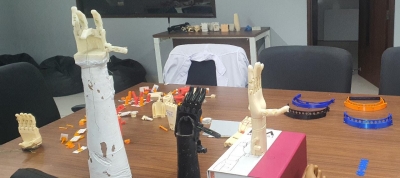After Jaipur Foot, Pink City scripts innovation tale with Jaipur Hand
By IANS | Published: November 28, 2021 09:15 AM2021-11-28T09:15:17+5:302021-11-28T09:40:15+5:30
Jaipur, Nov 28 After gaining global recognition with the Jaipur Foot which helped physically disabled people realise their ...

After Jaipur Foot, Pink City scripts innovation tale with Jaipur Hand
Jaipur, Nov 28 After gaining global recognition with the Jaipur Foot which helped physically disabled people realise their dream to stand on their feet, the Pink City is garnering worldwide acclaim as students of a private university have created the prosthetic hand in its incubation centre which is equipping amputees globally with prosthetic arms.
In fact, the start-up created two years back is now worth crores of rupees and is attracting laurels globally.
Says Professor N.N. Sharma, Pro-President, Manipal University Jaipur, "The story of conceptualisation of prosthetic hands is very interesting. Two years back, Bhagwan Mahaveer Viklang Sahayata Samiti officials who knew our vice chancellor visited Manipal University and asked if we can start making prosthetic hands. They knew I had a robotics background."
"We brought a prosthetic hand from China because it was less costly as compared to other parts of the world. The cost of one hand is around Rs 1 lakh. We want it to be affordable. So if you can make it here, the reach and affordability of prosthetic hands shall increase.
"We shared the idea with students and they started working on three dimensions of prosthetic hands the first one was mechanics, the second was electronic and the third was myo which was muscle operated and ideated on working on muscle signals. Work on this third format still continues," he added.
Working on the electronic and mechanical dimension, the students rolled out Piltover Technology Pvt Ltd (an incubation of Manipal University Jaipur's students) and brought down the cost of the prosthetic hand (from China) from Rs 1 lakh to Rs 15000.
The start up was floated via our incubation centre by Manan Issar who left his studies and jumped into his dream venture. Along with his team, the company is now highly valued after incubating here. One of Issar's company rooms is here, but he is in Bengaluru, said Sharma, adding, "I shall now train other students to develop the third version which is the Myo hand version."
The other innovation we are ideating on is Nano swimmer robots. We are planning to start a lab here soon on Nanotechnology to start working on further innovations, Sharma informed.
A scientist in the 1970s said ‘swallow the doctor' which has been a great call and worked on the idea that there should be someone who can go inside your body and put medicines in veins, arteries or an organ which wants a certain dose, he said.
In the next three decades, robots will get inside our body as we will swallow it like pills and then it will come out on its own. Scientists are bent upon making it possible, Sharma added.
Nano robots won't be like he will walk, or fight wars but will achieve functionalities. If the artery is blocked, it will do the operation, clear the artery. It will be a swimmer. It will go inside the body and swim.
The basic idea is to work on nano swimmer robots which shall enable nano-sized robots to go into veins and clear the blockage and so on, said Sharma.
In fact, we are working on a lot of projects here and everything is being done here with a societal connection. Marble dust powder in marble city Kishangarh is converted into a non inflammable substance and unbreakable tiles at much lower cost. The person who is doing it is now incubating here, informed Sharma.
From waste, we are making chemicals by upcycling. Coconut waste is being used for this purpose. The response is overwhelming as everyone is interested in recycling waste these days, he added.
Dr G K Prabhu, President, Manipal University, Jaipur, said "Any organisation which wants to grow needs to have a creative quotient and it must think differently, as an individual and for the organisation. Going with this principle, our faculties are coming from different backgrounds. The best of brains are coming together here to create an ecosystem for promoting, encouraging and rewarding innovation."
"We have been rewarding those working hard each month and hand holding them when they are going ahead in research. We listen to their problems and try to resolve them.
"Presently, our major roadblock is FCRA, many faculty members are writing grants for national and international agencies but FCRA norms are blocking us. The government should see who is using and misusing it; we have been struggling and not getting it in since the last three years. Our researchers have done voluminous research, however the funds crisis poses a major challenge and needs to be resolved immediately," he added.
Disclaimer: This post has been auto-published from an agency feed without any modifications to the text and has not been reviewed by an editor
Open in app